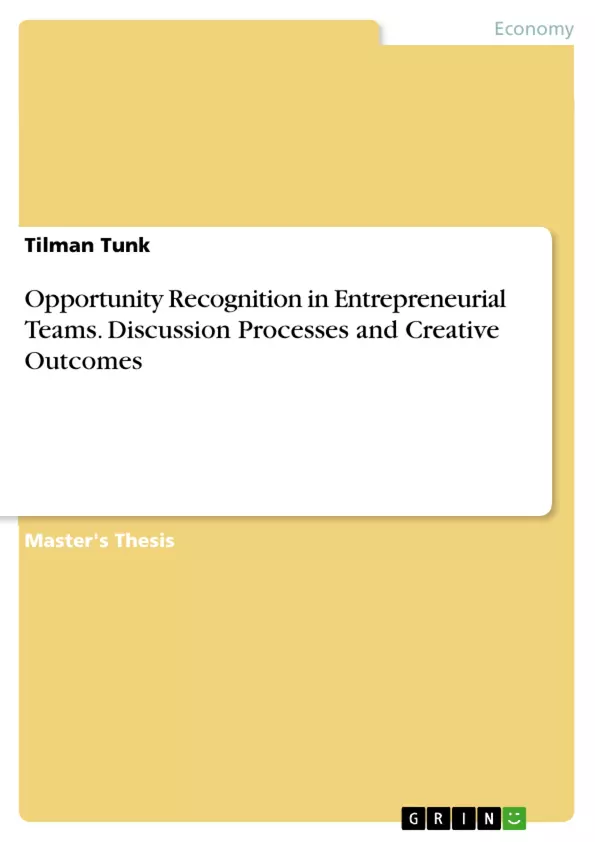This thesis is approaching this issue of opportunity recognition based on team creative cognition and a product-oriented view at creativity, and thus at how the team discussion process of idea-generation is shaping entrepreneurial opportunities.
Substantial gains can be made by entrepreneurial teams when recognizing promising business ideas. Academic research at the intersection of entrepreneurship and cognition has thus recently focused on how entrepreneurial teams generate business ideas and opportunities in order to understand the team decision processes of recognizing original and feasible opportunities.
Therefore, creativity (original and feasible outcome) in its multifaceted cognitive manner plays an essential role in generating ideas. However, empirical research on the influence of entrepreneurial team cognition (ETC) on the generation, recognition, and configuration of such ideas is still lacking.
Based on existing literature in creative cognition the entire idea-generation process is operationalized through convergent and divergent thinking phases and analyzed through conducting a quantitative experiment to examine possible relationships between the created variables. It turns out, that in convergent thinking, entrepreneurial teams generated and recognized less original but more feasible idea sets and final opportunities. In this regard, divergent thinking has an enhancement effect on original sets of ideas. These first findings are finally discussed against the background of ETC and shown to help to facilitate entrepreneurship research in this context to new insights separated from personal creativity skills, and further to assist entrepreneurs in recognizing opportunities in a practical way.
Inhaltsverzeichnis (Table of Contents)
- 1 Introduction
- 2 Literature Review
- 2.1 Product-Oriented Perspective on Team Creativity
- 2.2 Entrepreneurial Team Cognition
- 2.2.1 Framework
- 2.2.2 Team Creative Cognition as an Emergent State
- 2.2.3 Inputs on Team Creative Cognition
- 2.2.4 Mediators on Team Creative Cognition
- 2.2.5 Opportunity Recognition as the Output of Team Creative Cognition
- 2.2.6 Recognition of Original and Feasible Opportunities
- 2.3 Conceptualization of Idea-Generation
- 2.4 Research Hypotheses - How to Generate Novel and Feasible Ideas?
- 3 Research Operationalization and Methodology
- 3.1 Participants and Experiment Procedure
- 3.2 Measurement
- 3.2.1 Data Collection and Analytic Strategy
- 3.2.2 Coding the Idea-Generation Process
- 3.2.3 Opportunity Originality and Feasibility Rating
- 3.2.4 Calculations
- 4 Results
- 4.1 Summary Statistics
- 4.2 Correlation of Discussion Phases and Opportunity Recognition
- 5 Discussion
- 5.1 Idea-Generation Processes and Creative Opportunities
- 5.2 Conceptual and Empirical Limitations
- 5.3 Implications for Further Research
- 6 Conclusion
Zielsetzung und Themenschwerpunkte (Objectives and Key Themes)
This master's thesis investigates the relationship between discussion processes within entrepreneurial teams and their ability to recognize creative opportunities. The study examines how the dynamics of team communication influence the generation of novel and feasible ideas.
- The impact of team discussion processes on opportunity recognition
- The role of team creative cognition in entrepreneurial idea generation
- The relationship between discussion phases and the emergence of original and feasible opportunities
- The development and testing of research hypotheses on the factors influencing creative idea generation
- The implications for further research on team dynamics and opportunity recognition
Zusammenfassung der Kapitel (Chapter Summaries)
- Chapter 1 provides an introduction to the research topic, outlining the importance of opportunity recognition for entrepreneurial teams.
- Chapter 2 presents a literature review that explores various theoretical frameworks related to team creativity and entrepreneurial cognition, including the concept of opportunity recognition as an outcome of team creative processes.
- Chapter 3 describes the research methodology, including the experimental design, participant selection, and data collection procedures.
- Chapter 4 presents the results of the study, analyzing the correlation between discussion phases and opportunity recognition.
- Chapter 5 discusses the findings, exploring the implications for understanding the relationship between team dynamics and creative outcomes.
Schlüsselwörter (Keywords)
Entrepreneurial teams, opportunity recognition, team creativity, creative cognition, idea generation, discussion processes, emergent states, novel opportunities, feasible ideas, empirical research.
Frequently Asked Questions
How does team discussion influence the recognition of business opportunities?
The dynamics of team communication shape the idea-generation process, determining whether the recognized opportunities are merely feasible or truly original.
What is the difference between divergent and convergent thinking in entrepreneurship?
Divergent thinking focuses on generating a wide variety of original ideas, while convergent thinking is used to narrow down those ideas into feasible, practical business opportunities.
What is Entrepreneurial Team Cognition (ETC)?
ETC refers to the collective mental processes of a team that influence how they generate, recognize, and configure business ideas beyond their individual creativity skills.
Why do teams often recognize fewer original ideas during convergent phases?
Research shows that during convergent thinking, teams tend to prioritize feasibility and practical implementation over high levels of originality.
How was the study conducted?
The thesis used a quantitative experiment where idea-generation processes were coded and analyzed to measure the relationship between discussion phases and creative outcomes.
- Arbeit zitieren
- Tilman Tunk (Autor:in), 2017, Opportunity Recognition in Entrepreneurial Teams. Discussion Processes and Creative Outcomes, München, GRIN Verlag, https://www.grin.com/document/493467



